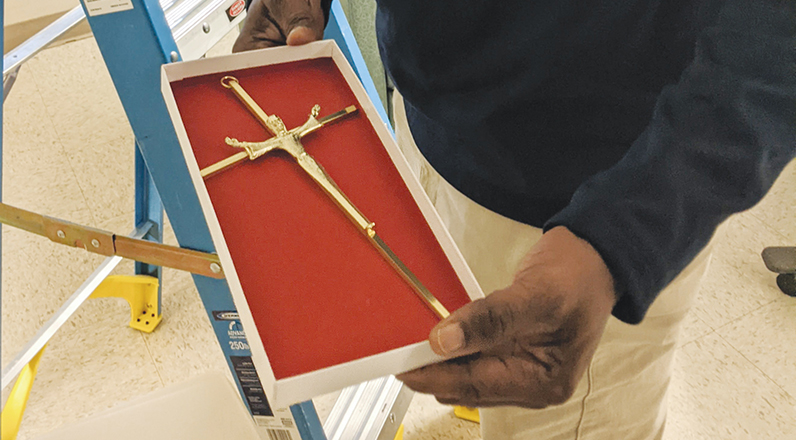
St. Joseph's/Candler in Savannah, Georgia, places crucifixes in patient rooms and offers crucifixes at no cost for patients to take home with them.
For about 20 years, St. Joseph's/Candler in Savannah, Georgia, has placed crucifixes in every patient room at both its 330-bed Catholic hospital — St. Joseph's Hospital — and at its 384-bed Methodist hospital — Candler Hospital.
Then, around the time the pandemic began, hospital leadership began noticing that an increasing number of crucifixes were going missing. Speaking with nursing and pastoral care teams, the leaders learned that it had become increasingly common for patients to request upon discharge to take home the crucifixes. And, in a couple of cases, people had just taken the crucifixes from the rooms.
St. Joseph's/Candler leadership decided that the hospitals should offer crucifixes to every inpatient as part of the organization's spiritual care programming.
The crucifixes that St. Joseph's/Candler offers patients are 10 inches long and 5 inches wide. The risen Christ is in gold embellishment. Before the crucifixes are placed in a room or given to a patient, they are blessed by a priest from the pastoral care department.

Paul P. Hinchey, president and CEO of St. Joseph's/Candler for more than 30 years, says, "We wanted the crucifix — the risen Christ in all His glory — to be a symbol of hope to our patients. We know a lot goes on in patient rooms, and we have the crucifixes on the wall at the end of their bed, so they can meditate or pray."
Hinchey says he has been shocked at the number of crucifixes the two hospitals have given out in the last several years. The hospitals give out 250-400 a year.
St. Joseph's/Candler prioritizes spiritual care, and so it ensures that the 12 chaplains who serve the two hospitals are rounding daily. It is often during those rounds that chaplains will offer patients a crucifix. Hinchey said many people don't know where to buy crucifixes and so they appreciate the gift from the hospital. The chaplains do not carry the crucifixes with them. They or other staff members can alert a small team in the mission department, affectionately referred to as the "crucifix squad," to deliver the crucifixes.
Hinchey hears from nursing and pastoral care staff that patients express gratitude for the gift. One man who was dying said the crucifix in his room had been comforting and he wanted one for his home. He said upon his death his son would have the crucifix to remember him.
Another patient had similarly told the care team that the crucifix had provided a source of hope during the tribulations of surgery. The patient wanted to continue to have that visual reminder of hope at home.
"These crucifixes are becoming part of our brand," says Hinchey, "and that is really, really neat."
